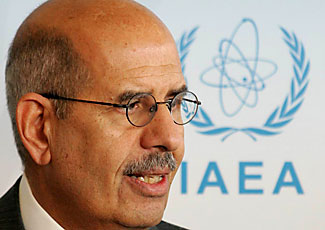Talks on nuclear fuel bank to get underway, three plans tabled
 Berlin/Vienna Efforts by the International Atomic Energy Agency (IAEA) to prevent countries from acquiring nuclear technology by offering them alternatives got a new boost this week as three plans for nuclear fuel banks and multinational fuel factories were tabled.
Berlin/Vienna Efforts by the International Atomic Energy Agency (IAEA) to prevent countries from acquiring nuclear technology by offering them alternatives got a new boost this week as three plans for nuclear fuel banks and multinational fuel factories were tabled.
The latest proposal was put forward by Germany on Friday. The text foresees the creation of an internationally-governed nuclear fuel production plant.
Two additional, complementary, proposals for Russian and IAEA fuel banks to provide supply of last resort are also to be considered by the 35 countries on the IAEA's governing board in June.
The ideas were proposed by IAEA chief Mohamed ElBaradei in 2003 to keep countries such as Iran from acquiring uranium enrichment and reprocessing technologies, which can be used not only for energy purposes, but also for making nuclear bomb material.
Germany said its plan for a multinational plant located in a yet- to-be specified country "provides States with a maximum of security of supply without the cost, unpredictability and proliferation risk involved in creating national enrichment capabilities."
With the fuel banks, the idea is to sway countries to buy nuclear fuel from abroad, by providing them with a backup mechanism of a fuel bank, in case their supplier country cuts off shipments for political reasons.
Earlier this week, the IAEA tabled its fuel bank plan after enough pledges had been collected for buying 60 to 90 tons low-enriched uranium for the bank, enough to reload one 1000-megawatt reactor over three years.
The IAEA's stockpile is being co-funded by the US-based Nuclear Threat Initiative, which pledged 50 million dollars on the condition that other countries come up with an additional 100 million dollars.
The European Union, Kuwait, Norway, the United Arab Emirates and the United States reached the target in early March.
Kazakhstan informed the IAEA Monday that it would consider hosting the physical stockpile for the fuel bank.
In parallel, ElBaradei wants the IAEA board to consider a proposal under which Russia would produce and stock 120 tons of low-enriched uranium, which the nuclear agency would be able to dispense in a way similar to the fuel bank model.
Over 60 countries, most of them in the developing world, have told the IAEA that they might be interested in launching nuclear power programmes.
The United Arab Emirates plan to have three power plants operating by 2020, and a nuclear cooperation agreement with the US was green- lighted by President Barack Obama on Thursday.
Kuwait is considering to use nuclear power for energy and water desalination. (dpa)